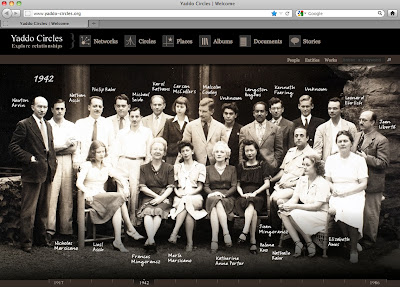Fordham’s commitment to fostering scholarship in the service of others was underscored at last week’s Growing Research panels, where a series of public digital humanities projects directed by Fordham faculty were profiled. Organized by James Wilson, Director of Faculty Development, “Crossing the Digital Divide” showcased an array of digital humanities projects with a shared commitment to open access.
|
 |
Growing Digital Research: Micki McGee introduces
panelists Patrick Hornbeck, Roger Panetta,
Barbara Mundy (partly hidden) and Damian Lyons. |
Sociology professor Micki McGee introduced the panel by providing an overview of the burgeoning field of digital humanities, highlighting both recent developments and the field’s surprisingly deep roots in the pioneering mid-20th century computational linguistic scholarship of Italian Jesuit Roberto Busa.
Project presentations by professors Patrick Hornbeck (Theology and Medieval Studies), Barbara Mundy (Art History), Roger Panetta (History), as well as by McGee (Sociology and Anthropology) highlighted the breadth and depth of collections and open research access tools in development by Fordham faculty. Ranging from a digital repository of Hudson River historical documents to a searchable online edition of the Latin works of 14th-century theologian John Wyclif, from the bi-lingual digital curation of thousands of Spanish American colonial artifacts to a social network mapping tool for charting artists’ communities, these projects share a commitment to open access scholarship as a service to the community.
Computer scientist Damian Lyons, chair of the Department of Computer and Information Sciences, served as a respondent, along with Fran Blumberg (Psychological & Educational Services) whose scholarship includes “video-game learning”; Leonard Cassuto (English), General Editor of the Cambridge History of the American Novel; Young Eun Lee (Information & Communication Systems), who researches the antecedents for and impacts of online communities; and Kristen Turner (Curriculum & Teaching), who is investigating Digitalk: The digital writing of adolescents. The afternoon concluded with discussion of the transformative effect of digital technologies on every aspect of higher education, from research, to teaching, to academic publishing.
 |
Dr. Barbara Mundy presented Vistas,
a digital resource of colonial
Spanish American artifacts. |
 |
Dr. Roger Panetta discussed the breadth of
resources available in the DigitalHudson collection at
Fordham’s Walsh Library. |
 |
|
Dr. Patrick Hornbeck, who co-chairs
Fordham’s Digital Humanities Working Group,
presented on The Latin Works of John Wyclif.
|
 |
Fordham University
Press Director Fredric Nachbaur raised
questions about the future of the book. |
All photos by Bruce Gilbert.






